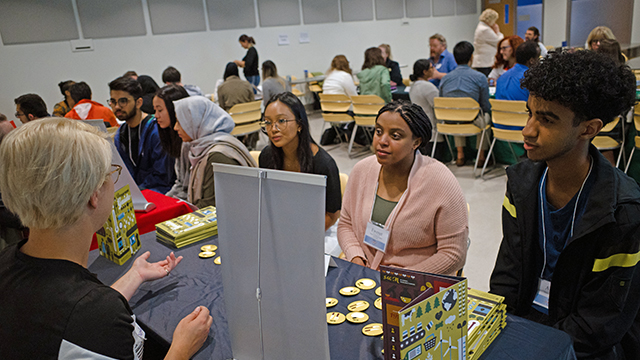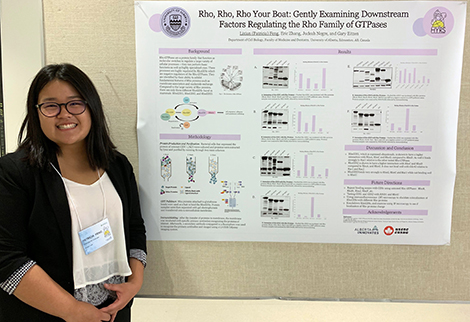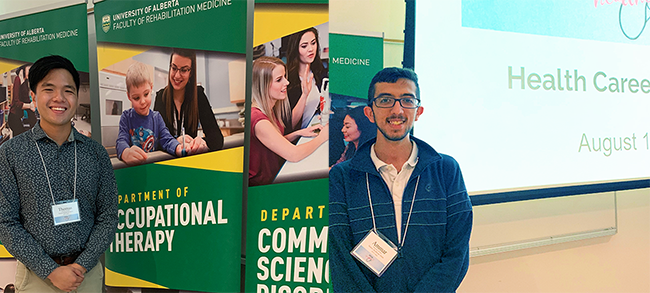
Venture Healthcare's Health Career Day. (Photo: Richard Huynh)
Patricia Feng spent six weeks of her summer vacation discovering research labs, making new friends, running experiments and learning how complex and fascinating cell biology could be. Coming from Cold Lake, Alberta, she had the chance to see a different side of science beyond her high school classes, thanks to a hands-on research program at the University of Alberta.
"My older sister did the Heritage Youth Researcher Summer program when she was in grade 11 and my parents wanted me to be exposed to a laboratory setting as well," explained Feng. "This program has introduced me to different perspectives, different people and new learning. It's been amazing."
This summer, high school students like Feng and undergraduate learners had a first-hand experience with health-care careers and settings, through two programs from the University of Alberta Faculty of Medicine & Dentistry. The Heritage Youth Researcher Summer (HYRS) program and Venture Healthcare are both initiatives from the Division of Community Engagement, reaching out to future students in hopes of increasing representation and diversity in health professions.
HYRS Student Summer Research Program: An early interest in health sciences
The HYRS program, in partnership with Alberta Innovates, allows 16-year-old students from Northern Alberta to learn about what it's like to work in a lab and discover a possible interest in health research. They shadow U of A scientists for six weeks and develop a short research project of their own.
"The goal is to show students before they come to university, that it isn't all just books and classrooms. It is a place where there are labs, work gets done, and there is innovation," said Gary Eitzen, director of the HYRS program.
This year, 29 students were paired with labs across campus that were conducting health-related research. According to Eitzen, there were additional activities for networking with each other and with other people at the U of A. In August, the students concluded the program with a poster presentation of their projects.
 Feng, participant of the program, completed an experiment related to the presence of specific proteins in cells, which could potentially be targeted to treat illnesses like breast cancer. After learning more about topics like medical genetics, she is interested in a career related to health sciences.
Feng, participant of the program, completed an experiment related to the presence of specific proteins in cells, which could potentially be targeted to treat illnesses like breast cancer. After learning more about topics like medical genetics, she is interested in a career related to health sciences.
"I enjoyed it a lot. My lab became a family in the end, they were the most supportive and kind people," said Feng. "I think even if a student has an interest in science and is not sure if it's a passion yet, they should apply for the program because this is an experience beyond anything that I can explain with words."
For Eitzen, the projects pursued each year by the young students are an impressive indicator of the capability of the next generation of health scientists. He hopes to continue with the program to expose more youth from different backgrounds to the possibilities of health research.
"The labs that take these students are really investing time in outreach, and I think that's important for us to get our message out. Not just amongst scientists-that's easy-but really to get this message out to the public."
Venture Healthcare: Health professions and social responsibility
Created by a University of Alberta student with the Division of Community Engagement, Venture Healthcare seeks to increase representation from different populations in health professions. For two weeks, undergraduate learners from different disciplines inside and outside of the U of A are able to learn about various careers, shadow professionals and get a close look at the day-to-day work in health-care settings. These visits are combined with workshops on topics like social determinants of health, power relations and social equity.
The program is complemented by a "career fair" day, where participants talk to representatives of university health programs to learn more about the professions and requirements.
According to An Nguyen, program director, the purpose of Venture Healthcare is to show students the wide variety of careers in health and encourage them to apply to programs that could seem too difficult to get into, or where they don't see themselves represented right now.
"I think this program is big on embolding individuals to go for it," said Nguyen. "They can believe in themselves, know that they are capable and that they actually hold really important experiences that can inform their practice when they go into the health field."
Thomas Nguyen, a sociology student with a longtime passion for health care, agrees.
"I know I was very intimidated-no one in my family had been in a health-care profession and very few graduated from university. Without programs like this, you don't get that exposure. So it just allows the field to be more representative of the populations that we serve. One of the big reasons why I wanted to go into health care is to help Vietnamese immigrants, like my mom and dad or my grandparents who don't understand English too well."
Through the program, Thomas found out about clinical social work and realized it was a good professional fit for his future. This was also the case of Ammar Burhani, a psychology student who discovered new professional options like occupational therapy and clinical neuropsychology.

Thomas Nguyen (left) and Ammar Burhani
"When you think of health care, the stereotypical careers that come to mind are doctors, nurses, or dentists. We have a really narrow view of what health is, and this really kind of opens your vision."
Nguyen highlights the variety of topics as a strength of this program.
"It's a two-week program, but so much happens. The learners get a lot of information and many contacts. Venture Healthcare is meant to build relationships, build social responsibility and educate our students that health care isn't only about the medicine and science, but it's also about the relational skills. It's about understanding society and social systems and why they matter in health."
For more information about applying to Venture Healthcare, email vhc@ualberta.ca.